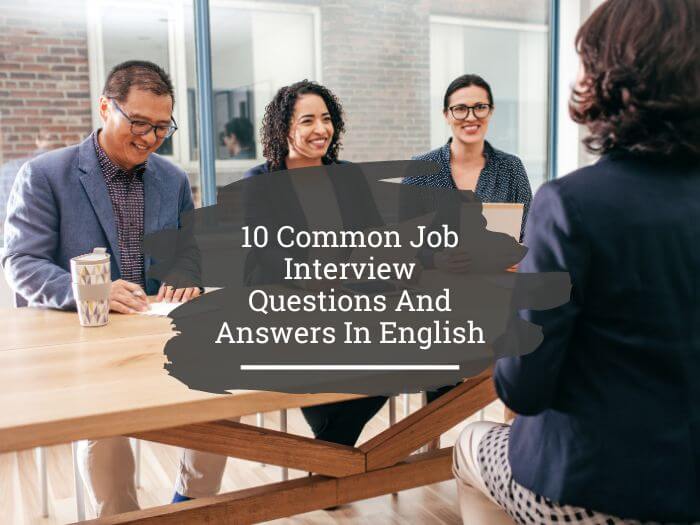You could view a job interview in English as an English language exam. What do I mean by this?
I mean that you can be a native speaker of English but fail an English language exam because you didn’t know what types of questions and tasks you had to complete.
At the same time, you can be the most skilled professional in the world but not get hired because you didn’t learn typical interview questions and answers in English.
Succeeding in a job interview is all about being prepared, especially if the interview is in English and not your first language.
This guide is here to help you do just that. I put together the 10 most common interview questions and answers in English.
I’m going to show you how you can answer them so you can prepare in advance, make a great impression on your potential employer and, fingers crossed, get the job you’re applying for.
Shall we start? Let’s go!
1. Tell Me About Yourself

Okay, I could write a full blog post just on this question as this is one of the trickiest ones to answer.
What should you say when they ask you to talk about yourself? Should you tell the interviewer about your hobbies, your age, your hometown and all the jobs you’ve had in your life? Or should you speak about your qualifications and ambitions?
Let’s have a look at a sample answer taken from TheMuse.com – a career advice website.
Example Answer
“Sure! So I've always enjoyed writing and public speaking, even as far back as high school. This led me to pursue writing-related passions—for example in college, where I was an editor for our school newspaper. In addition to writing, I got to learn how to manage a team and how to approach the writing process. After college, I took a job at Acme as a social media manager, writing copy and social content for the company blog, but I raised my hand to work on the communications plan for a product launch, which is where I discovered my interest in product marketing. After switching to a product marketing role and managing the two most successful new product launches last year, I realized I'm excited to take on a new opportunity. I've learned I work best on products that I love and use, and given that I'm a big user of your company’s products, I jumped at the chance to apply when I saw the open posting.”
Interview questions and answers in English – sample answer to the question “tell me about yourself” from TheMuse.com
As you can see, you don’t need to talk about your your hobbies or your hometown. Instead, you should make your answer relevant to the job you’re applying for.
But you may say, “Okay, but what exactly should I focus my response on?”
Well, this very much depends on the job you're being interviewed for, whether it's a similar role to your current one or a complete career change.
But, as a general rule, you can follow this simple formula suggested by a career coach from The Muse:
Present – Past – Future
You first talk a little bit about your current role (present). Then you tell the interviewer what led you to this role (past) and, finally, you explain your future career plans (future), including why you’re interested in the job you’re applying for.
So here you would need to really polish up your English tenses as you may need to speak about different times of your life.
Some Useful Phrases To Help You:
- I have a strong background in [your relevant field/industry].
- I graduated from [mention your educational institution] with a degree in [your major].
- I have [X years] of experience in [specific area/industry].
- Throughout my career, I've had the opportunity to work with [mention any notable companies or projects].
- I'm particularly skilled in [mention a key skill or expertise relevant to the job].
- I'm passionate about [mention a relevant aspect of the industry or role].
- In my previous role at [previous company], I [mention an accomplishment or responsibility that highlights your skills].
- I thrive in [mention a work environment or situation where you excel].
- I'm known for my [mention a positive trait, such as ‘attention to detail' or ‘problem-solving skills'].
- I’m now looking forward to [mention some of your ambitions or career goals that you’re excited about]
- I'm now excited about the opportunity to [mention something specific about the job or company that interests you].
You can learn more about how to answer this question here.
2. Why Do You Want To Work At This Company?

“Because you’re a marketing agency and I’m looking for a job in a marketing agency.” That wouldn’t impress anyone.
This is a question where you get a real chance to show the interviewer why you appreciate their company, how it can help you achieve your career goals, and what you benefits you could bring to it too.
So tell them what makes you want to specifically work for them.
Let’s have a look at an example.
Example Answer
“I want to work at this company because I've been impressed by your strong reputation for innovation and your commitment to excellence. I know that you value [mention the company’s value] and those align with my own. I believe that being a part of this team would not only provide me with valuable opportunities for professional development but also allow me to contribute my skills and expertise to help the company achieve its goals. I did some research on your recent projects, such as [mention a specific project or initiative], and I'm excited about the impact I can make by being a part of these exciting endeavors. I really see this as a place where I can both thrive personally and make a meaningful contribution to the company's success.”
Interview questions and answers in English – sample answer to “why do you want to work at this company? “
See how this works? So do some research, find out what you and the company have in common (vision, values, mission, goals, etc.) and let the interviewer know how you can help each other by working together.
Here are some useful phrases you can use:
- I'm impressed by [specific aspect of the company].
- I'm drawn to [company's attribute or quality].
- Your company's reputation for [positive characteristic] is appealing.
- I align with your values, particularly [mention a specific company value].
- I believe my skills can contribute to [company's goals or success].
- I see an opportunity to [mention what you hope to achieve or contribute].
- Your recent projects, such as [mention a specific project], [excite me / caught my attention].
- I'm excited about the impact I can make by [mention how you can contribute].
- The positive company culture and [mention another positive aspect, e.g., collaborative environment] [appeal to me / make me eager] to join your team.
- I'm motivated by your commitment to [mention a specific company commitment or initiative].
3. What Are Your Strengths?

Here you can tell them how great you are. But don’t just tell them. Show them.
Anyone can say, “I’m a great team player, I’m patient, I can do this very well, I have excellent communication skills, I’m a fast learner, blah blah blah.”
But not anyone can actually show their greatness. What do I mean by “showing”?
This is what I mean:
Telling:
“I’m a fast learner.”
Showing:
“I can learn pretty fast when it comes to tech tools. Last month I needed to create some slides for a meeting using a new presentation program I had never used before. No one in the office was familiar with the program either so I decided to spend some time researching and watching free tutorials on YouTube to learn how to use it. A couple of hours later I had already created nearly all the slides I needed and emailed them to my boss, who even complimented me for creating great visuals.
Can you see the difference? When you show, you give actual evidence of your strengths.
Interview questions and answers in English – sample answer to ‘”what are your strengths? “
Telling a story works really well for this.
You can use the STAR method (a popular technique you can use to prepare for behavioral and situational interview questions) to structure your stories.
In short, STAR works like this:
Situation: You describe the situation (using an unfamiliar presentation program).
Task: Explain what task you had to complete (creating slides for a meeting)
Action: Explain what you did to complete the task (doing some research and watching tutorials to learn how to use the program)
Result: Talk about the results of your actions (job done, happy boss)
Here are some useful phrases you can use to talk about your strengths:
- I excel in [mention a specific strength], which is an asset in this role/company because…
- My key strength is [mention your strength], and I see it as a valuable asset for this position because…
- I've been told that I have a knack for [mention your strength], and I believe it's particularly beneficial in this context because…
- One area where I shine is [mention your strength], and I think it's advantageous for this role because…
- I bring a strong skillset in [mention your strength], which I believe aligns well with the requirements of this role because…
Remember: use stories!
4. What Are Your Weaknesses?

Be honest when they’re asking you this question.
They’re giving you an opportunity to demonstrate self-awareness and your ability to address areas and skills you believe require improvement.
Choose a relevant weakness and present it in a way that shows you're committed to personal and professional growth. You can explain what steps you've taken to address it too.
For example, did you take any courses to get better at something? If so, mention that.
Let’s look at a possible answer to this question.
Example Answer
“One weakness I've identified is my public speaking skills. In my previous role, I occasionally had to give presentations, and I noticed that I felt nervous and my delivery could be improved. So I decided to enrol in a public speaking course and joined a local Toastmasters group to practice regularly. Since then, I've seen significant improvement in my confidence and communication abilities. I believe this experience has not only enhanced my public speaking but also my overall communication skills, which are crucial for collaborating effectively in a team-based role like the one here.”
Interview questions and answers in English – sample answer to “what are your weaknesses?”
You haven’t done anything to overcome your weakness? No problem. You can still talk about it in an open and honest way.
However, keep in mind that the interviewer might then ask you, “So, how are you going to address this weakness?” Be ready to answer that too.
Some Useful Phrases:
- One area where I've noticed I can improve is [mention the weakness].
- I've identified a weakness in [mention the specific skill or trait].
- To address this, I've been [mention what you've been doing to improve, e.g., taking online courses or seeking feedback from colleagues].
- I've taken steps to improve my [mention the weakness] by [mention the steps or strategies you've used, e.g., practising regularly or setting clear goals for improvement].
- I believe in self-improvement and have been actively working on [mention the specific weakness].
- This has been an opportunity for me to learn and grow in the area of [mention the weakness].
- I'm committed to overcoming this weakness through [mention your commitment to improvement, e.g., continuous learning or consistent practice].
- I've seen progress in this area by [mention the progress or positive outcomes you've observed, e.g., receiving positive feedback or achieving better results in recent projects].
- I'm dedicated to developing my skills further, particularly in [mention the skill or trait related to the weakness].
- I'm aware of the importance of addressing this weakness for my professional growth, and I'm actively working on it.
5. Tell Me About A Time When You…

I love this question because this is another clear invitation to tell a story. And here at StoryLearning we love stories!
The question can have different endings. Here are some possibilities:
- Tell me about a time when you…
- …faced a significant challenge at work.
- …had to work under tight deadlines.
- …had to resolve a conflict with a colleague or team member.
- …demonstrated strong leadership skills.
- …had to adapt to a rapidly changing situation or project.
- …completed a project successfully.
- …had to use your problem-solving abilities.
Again, you can structure your story using the STAR technique.
Here’s an example answer for “Tell me about a time when you faced a significant challenge at work”:
“In a previous project management role, I encountered a major challenge when our project's scope changed and the timeline was shortened significantly. To address this I organised a team meeting, redistributed responsibilities, and introduced a project management tool. We managed to successfully deliver the project ahead of the revised deadline and the client was delighted with the results.”
Interview questions and answers in English – sample answer to “tell me about a time when…”
It would be great if you ended your story by telling what you learned from the experience.
For example, you could end the story above by saying something like, “This experience taught me the importance of adaptability, effective communication, and teamwork in overcoming significant challenges at work.”
Some useful phrases to begin your story:
- In a previous role, I encountered a situation where [describe the context or challenge].
- During my experience at [previous company], there was an instance when [describe the specific scenario].
- I can recall a time when [mention the situation or challenge you faced].
- Once, while working on [mention a project or task], I had to handle a situation where [describe the circumstances].
- In my career, I've come across situations where [describe the relevant experience].
- At a previous job, there was a particular case when [provide context for the situation].
- In the past, I've had to navigate challenges such as [mention the type of challenge or problem].
- I remember an occasion when [describe the event or challenge].
- During my professional journey, there was a moment when [mention the situation or task].
- One example that comes to mind is when [mention the specific experience or scenario].
6. What Are Your Salary Expectations?
Money is no object. Ever heard of this English idiom? This is an English idiomatic expression that means money is not something that needs to be considered because you have plenty of it available.
Sorry but this is not true at a job interview. Money must be considered when you’re applying for a job and your potential employer needs to take the financial aspect into account too.
You’re an investment for them so they need to make sure they can afford you.
So how do you answer this question? Workplace expert Amy Gallo from Harward Business Review suggests two strategies:
1. Redirect the conversation: You can do this by either turning the question around and asking them about their budget
Example answer:
“I don't have the full picture of what the job entails right now, so it's hard for me to give an exact salary expectation. But I'm really curious to know what salary range you have in mind for this role.”
Interview questions and answers in English – sample answer to “what are your salary expectations?”
2. Offer a salary range: Make sure you have enough information to make your offer. You don't want to ask for £4000 a month when the average salary for the position is £1000.
Example answer:
“I'm aiming for a fair salary that matches my skills and background. From what I've gathered about the role and my research, I'd anticipate a salary somewhere between $X and $Y.”
Interview questions and answers in English – sample answer to “what are your salary expectations?”
Some Useful Phrases:
- I'd like my salary to be in line with industry standards for someone with my qualifications.
- I'm flexible when it comes to salary, but I'm aiming for a range of [$X to $Y], depending on the overall compensation package.
- It's important for me to feel that my compensation reflects the [responsibilities/challenges] of the role.
- I understand that compensation can vary based on factors like location and company size, so I'm open to discussing what works best for this position.
- I'm confident that we can come to an agreement that's fair and mutually beneficial.
- I'm eager to contribute my skills and experience to the team and believe that a fair salary will align with the value I bring.
7. What Are Your Career Aspirations?

Maybe you want to start your own business one day, or maybe you have a strong desire to help a particular group of people through your work.
Talk about your career dreams!
Share these ambitions you have and explain what makes you excited about your professional future and why.
It would be great to also mention how the role you’re applying for can contribute to the achievement of your goals. Recruiters would appreciate that.
Example Answer:
“Well, growing up in a tech-savvy world, my big career dream is to use my love for tech and solving problems to make a real difference in the industry. Right now I work as a software developer, and I'm all about creating user-friendly apps. This role aligns perfectly with my aspirations because it would let me use my skills to work on projects I'm really excited about. I'm eager to use what I know to help your team push tech boundaries and make a positive impact. In the next few years, I hope to tackle even bigger challenges and be a driving force behind tech innovations that benefit both users and the company.”
Interview questions and answers in English – sample answer to “What are your career aspirations?”
Useful Phrases:
- I have two main career aspirations in mind. First, I'd like to [mention your short-term aspiration]. Second, I aim to [mention your long-term aspiration].
- My career aspirations revolve around [mention a key theme or focus].
- In the short term, I'm really excited about [mention a specific aspect of the job or industry].
- Looking ahead, I envision [mention a long-term goal related to career progression or personal growth].
- Ultimately, my goal is to [mention the overarching aspiration that ties your short-term and long-term goals together].
- I'm committed to [mention your dedication to achieving your career aspirations].
- I believe this role aligns with my career aspirations because [mention how the job or company fits into your career goals].
- I'm excited about the potential to [mention how the job can help you achieve your career aspirations].
8. Sell Me This Pen

This is a test the interviewer might ask you to take if you’re applying for a sales job. It’ll show them how well you can cope under pressure and they can get an initial insight into your selling skills.
But this is not something that only happens in the world of sales. Recruiters might test your skills and abilities right there in front of them even if the role is not connected to selling products.
For example, candidates for the position of barista in a cafè may be asked to make the best cappuccino they could possibly make.
English teachers may be given some time to plan a language lesson and then take the interviewer through the decision-making process that went into their plan (this happened to me twice!).
So there’s no sample answer or suggested phrases in English for this question as it really depends on what the test involves.
But I can give you three top tips:
- Stay calm. You’re being interviewed for this job so it’s highly likely you have the skills to pass the test.
- Don’t try out something new you’ve never done before. Go with what you know.
- Look confident (even if you’re not feeling so).
If you’re a sales worker, you can find more detailed tips on how to answer “Sell me this pen” here.
9. When Would You Be Available To Start?

The answer to this question depends on whether or not you need to give notice to your current employer or have other commitments to meet.
Here are some ways to answer and useful phrases you can use:
- I am available to start immediately if I am offered the position.
- My availability depends on the notice period I need to give to my current employer, but it's usually two weeks.
- I would need a two-week notice period to wrap up my current responsibilities at my current job.
- I can start at your earliest convenience if I'm selected.
- My current commitment will end in two weeks, so I can start right after that.
- I have some personal obligations that I need to conclude within the next month, so I'd be able to start in about a month's time.
- I'd like to discuss the starting date if I receive an offer, as I want to ensure a smooth transition for both my current and future employer.
- I'm flexible with my start date to accommodate the needs of the new team.
10. Do You Have Any Questions For Us?

Of all the interview questions and answers in English on this list, this one is perhaps the most common.
There hasn’t been a job interview in my life where I didn’t get asked this question at the end.
This is an easy one to answer and it’s the last chance to impress the interviewer.
Let’s take a quick test.
Read the following answers you may give in response to this question. Which one, do you think, the interviewer would appreciate more?
Answer 1: “Yes, I do have a question. How much is the coffee at the vending machines you have in the office?”
Answer 2: “Yes, I do have a question. What do you like most about working here?”
Number 2, that’s right.
So be prepared with some of the less-frequent questions you may ask at the end. Something you genuinely want to know about the position, company or work environment.
In an interview I had years ago at a language school, I remember asking the Director of Studies if they had a learning centre where students could borrow books.
He was glad I asked him that question and we talked about it for a while. Oh, and I got the job in the end!
Giving good answers is important, and so is asking good questions!
Here Are Some Good Questions You Could Ask:
- What does success look like in this role, and how is it measured?
- Can you describe the team's dynamic and how collaboration is encouraged here?
- What are the company's long-term goals, and how does this role contribute to achieving them?
- What opportunities for professional development and growth does the company offer?
- Can you share more about the typical career progression for someone in this position?
- How does the company foster a diverse and inclusive workplace?
- What are the biggest challenges the team is currently facing?
- Can you provide insights into the company's approach to work-life balance and employee well-being?
- How does the company stay innovative and adapt to industry changes?
Interview Questions And Answers In English: Prepare Yourself

All right, now that you’ve analysed some of the most common interview questions and answers in English, I’d like to leave you with some great tips on how can you prepare to answer them.
These are my favourite:
- Record yourself answering the questions many times. This will help you improve your fluency.
- Answer the questions by using the 4-3-2 technique. This, too, will dramatically boost your fluency.
- Research the company. Find out as much as possible before the interview.
- Invite a friend to do a job interview role-play with you. Your friend can act as the interviewer and ask you questions.
- Consider taking a short English course in preparation for the interview. It’s an investment worth making.
That’s all! I hope you’ve found this guide useful. And best of luck with your job hunting!

Olly Richards
Creator of the StoryLearning® Method
Olly Richards is a renowned polyglot and language learning expert with over 15 years of experience teaching millions through his innovative StoryLearning® method. He is the creator of StoryLearning, one of the world's largest language learning blogs with 500,000+ monthly readers.
Olly has authored 30+ language learning books and courses, including the bestselling "Short Stories" series published by Teach Yourself.
When not developing new teaching methods, Richards practices what he preaches—he speaks 8 languages fluently and continues learning new ones through his own methodology.










































